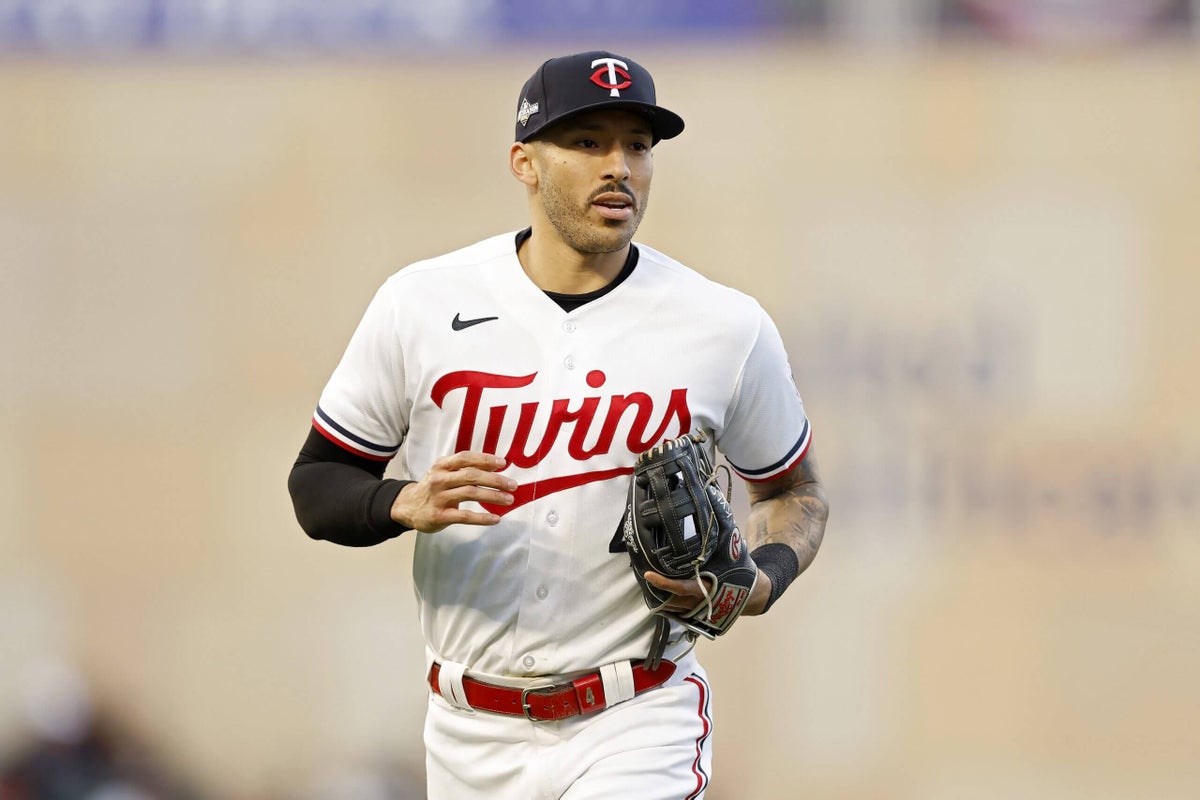DALLAS — Juan Soto is off the board, and it could lead his unfulfilled suitors to gauge whether the Twins would trade Carlos Correa.
Despite the Twins being in a tight spot financially, Derek Falvey said Monday afternoon that although he’s open to listening to those ideas, he isn’t looking to simply shed Correa’s salary.
With the team trying to rebound from last season’s dismal fourth-place finish, the Twins’ president of baseball operations said during the Winter Meetings that his club remains bullish on the three-time All-Star shortstop.
If teams want to try to pry away Correa, who according to FanGraphs was worth 4.3 WAR last season, they’d need to pay a high premium.
“When (Correa) was on the field, he was one of the best players in the game,” Falvey said. “Ultimately, he didn’t play as many games as we would have liked because he was dealing with the plantar fasciitis. That was unfortunate. But when he played, he was really good for us. He’s a leader. He’s a key member of the clubhouse. Obviously, you expect teams to call on players like that, especially with where we are and some of the conversations we’re having with other clubs. But we want to win, so a high bar is set.”
Given the Twins’ precarious self-imposed financial position, it’s only natural for teams with bigger revenue streams to go fishing and see if they can pick off a player like Correa, who could be a difference-maker on a championship-caliber club. Correa batted .310/.388/.517 with 14 home runs and 54 RBIs in 367 plate appearances last season.
Though the Twins aren’t reducing payroll for the upcoming season, their budget calls for the team to field a roster for $130 million, as it did in 2024. As constructed, the Twins’ payroll is roughly $140 million, which means they likely will try to shed several contracts.
Correa, who’s dealt with plantar fasciitis in each of the past two seasons, is set to earn $36 million this season and is owed $128 million over the next four years, according to Cot’s Contracts. Unloading his contract would provide the Twins with more room to operate and sign or trade for additional players to fill out the roster.
But it would also rob them of their best player, one whose potential value would be nearly impossible to replace no matter how much money the Twins freed up.
Multiple team sources in Dallas said it’s hard to envision the Twins trading Correa.
Instead, the Twins are much likelier to try to trade pitcher Chris Paddack, who is set to earn $7.5 million, catcher Christian Vázquez ($10 million) or Willi Castro, who could earn $6.2 million in arbitration. Although they’d prefer to fetch something tangible in return for any of those players, the Twins would likely accept getting out from under those salaries in order to spend the money elsewhere.
“It’s definitely picked up some where we’re having more conversations,” Falvey said. “I think the more the free-agent market progresses, and some things fall off there, the more likely it is that it picks up on the trade market. It’s been rare, in my experience, that the trade market is the first to go. Usually, a few free-agent dominoes fall and then you start the trade market conversation. That typically happens after the Winter Meetings, though there are a lot of conversations happening here now. We’re having a lot of dialogue around that at this stage.”
What complicates the matter — aside from the Twins’ desire to win in 2025 — is Correa’s no-trade clause. He has the ultimate veto power.
But regardless of what obstacles are in place, Falvey and general manager Jeremy Zoll will entertain any and all offers because they know it could lead them to learning about a player they desire being available in trade. Several years ago, similar discussions led the Twins to discover Pablo López was available.
“We get calls on a lot of our players — some that we have to listen and we have to hear the conversation,” Falvey said. “Some that go absolutely nowhere, but they are the guys you would expect teams would call on. In light of the team sale situation, some of the dynamics around our roster or otherwise, I think there are enough teams checking in. What we tell every team is ‘Listen, we’re open to being creative. We can’t rule anything out before we hear it, no matter who the player is.’ We’ll just be respectful of their process, what they are going through and trying to kick some creative ideas around. … We have to stay open-minded to those things.”
(Photo: David Berding / Getty Images)

